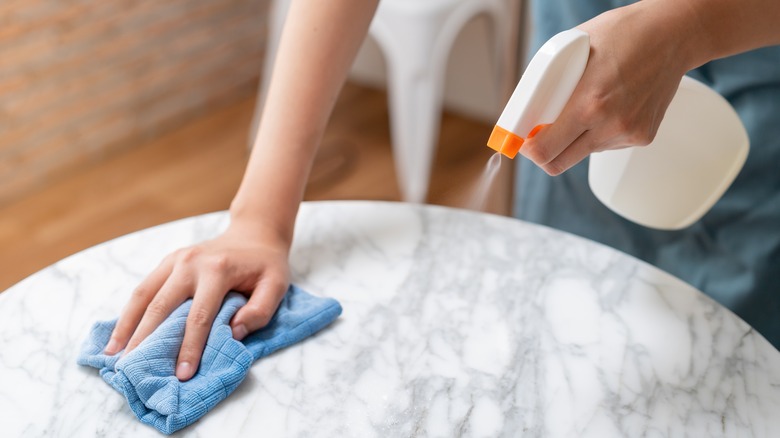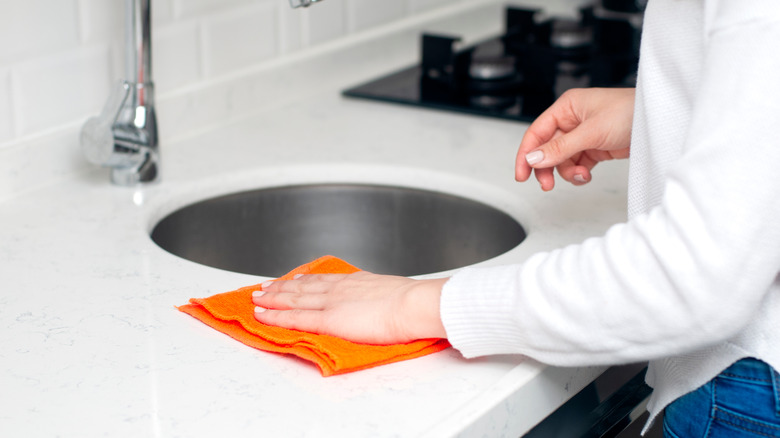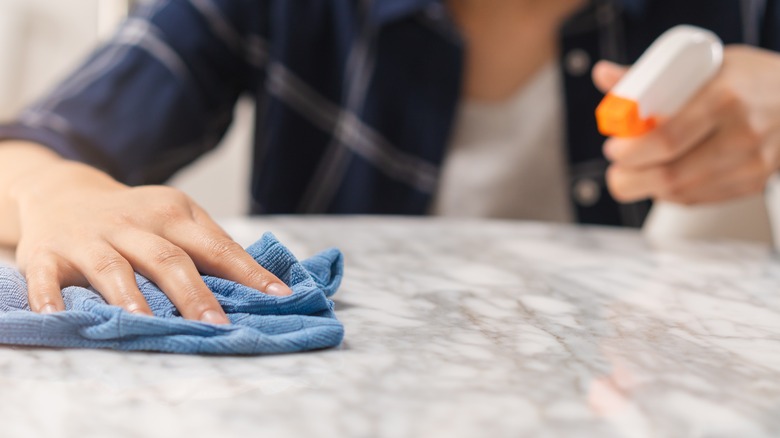The Safe Cleaner That'll Keep Your Marble Countertops Sparkling
Marble countertops can be a beautiful and sleek addition to your kitchen or bathroom aesthetic. Forbes even argues that having marble countertops in your home could elevate the value of your property. Nevertheless, if you're thinking of investing in marble countertops, beware that they can be difficult to clean due to their porous nature and susceptibility to damage from acidic or abrasive cleaners. Since many household cleaners contain acidic ingredients like vinegar, lemon, or ammonia, these products can accidentally etch the marble's surface, resulting in dullness or discoloration with continued use. Consistent use of improper cleaning products can significantly damage your countertops, so you should use the right products. One product that is considered safe and effective for marble counters is rubbing alcohol.
One of the best ways to clean marble countertops is by picking up an inexpensive bottle of rubbing alcohol. Forget about the costly and harsh chemical cleaners and trade them in for this simple solution that is gentle on the delicate surface of marble countertops. Rubbing alcohol is not acidic or abrasive but still contains disinfectant properties, making it an excellent and safe choice for kitchen or bathroom counters. Applying it to your marble surfaces will eliminate bacteria, fungi, and viruses all in one swipe. Mix in a few drops of your favorite essential oil and you'll have your marble countertops sparkling and smelling fresh in no time at all.
How to clean marble countertops with rubbing alcohol
If you've installed marble countertops in your home and are in need of an easy and simple homemade cleaner, then start with a bottle of isopropyl alcohol. You'll also need a spray bottle, water, dish soap, and to personalize it a few drops of your favorite essential oil. Tea tree, lavender, or eucalyptus will leave your kitchen and bathroom smelling clean and fresh. To get started, add two cups of water to the spray bottle and mix in ¼ cup of rubbing alcohol. To that mixture, add a few drops of dish soap and 5-10 drops of your chosen essential oil. Secure the top on the spray bottle and give it a vigorous shake to incorporate all of the ingredients.
When you're ready to clean your counters, first use a clean, dry cloth to wipe away crumbs, hair, or other debris that may be lurking on the surface. Then spray the counters with your alcohol mixture, ensuring the entire surface is covered. Allow the solution to sit for at least a minute but preferably about five so the alcohol can disinfect any microorganisms on the marble. Once the solution has set for the allotted time, use another clean, dry cloth to wipe up the solution from the countertops. Be sure to get the entire surface so you don't leave any behind or leave streaks on the top. A microfiber cloth is best for eliminating any marks.
Cautions for this method
Switching to rubbing alcohol is a clever way to clean your marble countertops without having to resort to harmful commercial chemicals. That being said, there are a few cautions to consider before proceeding with this method. The first recommendation to keep in mind is that it's important to dilute rubbing alcohol in water before using it on your marble countertops. While this method is considered safe for marble, undiluted rubbing alcohol may be too strong for the delicate marble stone, causing etching or discoloration. On that same note, avoid pairing isopropyl alcohol with abrasive cleaning tools like scrubbers or scouring pads as these will likely leave visible marks on the marble. Instead, opt for a soft microfiber cloth or a gentle sponge to avoid damaging your counters.
Another tip is to always spot-test the cleaner in an inconspicuous area before applying it to the entire surface. While this method is considered safe for marble, not all stones are created equal and your slab could be on the sensitive side. If you notice any etching or discoloration, do not proceed with cleaning your entire counters. Contact your marble supplier for a safer method for cleaning and disinfecting your countertops. Finally, never mix different types of cleaners. Doing so can result in accidentally creating a dangerous liquid that can be fatal if inhaled or handled. Instead, choose one cleaner to utilize to protect you and your counters.


